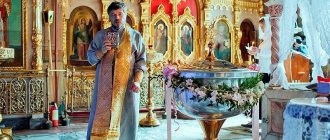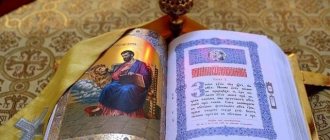Rules of Saint Basil the Great
Since the first centuries of Christianity, believers have had various perplexities: from issues of accepting people of other faiths to problems of monastic community or family. Even then, the Church began to turn to the experience of spiritual men, tested by their own deeds and prayer. In the treasury of such experience there is also “The Rules of St. Basil the Great."
Saint Basil the Great with his life of the 15th century. Wood, tempera. 98.5 × 78.5 cm Historical Museum, Sanok, Poland
What is a rule
This is what they usually call
- established canons that maintain discipline within the community, certain rules for the private life of the faithful;
- collections of these canons, for example, “The Book of Rules”, “The Helmsman” (Nomocanon), which contain both church regulations and ancient laws, the jurisdiction of which governed the life of church communities.
The current Rules are the fruit of the activities of the Ecumenical Councils, as well as a number of Local Councils, which gradually supplemented their number from the 1st to the 9th centuries. Since church institutions were adopted by the conciliar mind, on the basis of the spiritual experience of the Church and the saints, they are considered irrevocable. Even a change in life circumstances cannot provide grounds for the cancellation of one or another Rule, even if it ceases to be applied or is applied incompletely.
Unlike dogmas, which talk about doctrine, canons are dedicated to the life of the Church in this world:
- repentant discipline;
- status of clergy, laity;
- management;
- various legal issues.
Currently, the Rules include:
- ascending to the Apostles;
- compiled by the Councils;
- patristic.
The saints of God, whose rules were adopted by the Councils, initially, as having true humility, did not intend to give rules to the entirety of the Church. Therefore, very often these are messages addressed to certain communities or bishops on certain issues of church life. Subsequently, they turned out to be useful for the entire church people, and therefore became part of the Rules.
Rule 1 About repentance, about the time of repentance, about its properties and fruits
Chapter 1.
Those who believe in the Lord must first of all repent, according to the preaching of John and according to the preaching of our Lord Jesus Christ Himself. For those who do not repent now will be condemned more than those condemned before the Gospel.
From that time Jesus began to preach and say: repent, for the kingdom of heaven is at hand.
(Matt. 4:17).
Then He began to reproach the cities in which His powers were most manifested, because they did not repent: woe to you, Chorazin!
woe to you, Bethsaida! For if the powers that were demonstrated in you had been demonstrated in Tire and Sidon, they would have repented long ago in sackcloth and ashes, but I say to you, it will be more tolerable for Tire and Sidon on the day of judgment than for you (Matthew 11:20-22), And so on.
Chapter 2.
The present time is a time of repentance and remission of sins, and in the next century there will be a righteous judgment of retribution.
But so that you may know that the Son of Man has authority on earth to forgive sins
[as He Himself] says (Mark 2:10).
Truly I say to you, whatever you bind on earth will be bound in heaven;
and whatever you permit on earth will be permitted in heaven. Truly I also tell you that if two of you agree on earth about anything they ask, it will be done for them by My Father in heaven (Matthew 18:18-19).
For the time is coming in which all who are in the tombs will hear the voice of the Son of God;
and those who have done good will come forth into the resurrection of life, and those who have done evil into the resurrection of condemnation (John 5:28-29).
Or do you neglect the riches of God’s goodness, meekness and long-suffering, not realizing that God’s goodness leads you to repentance?
But, due to your stubbornness and unrepentant heart, you are storing up wrath for yourself on the day of wrath and revelation of righteous judgment from God, who will reward everyone according to his deeds (Rom. 2:4-6).
So, leaving the times of ignorance, God now commands people everywhere to repent, for He has appointed a day in which He will judge the world in righteousness
(Acts 17:30-31).
Chapter 3.
Those who repent must cry bitterly and express everything else that is characteristic of repentance from the heart.
And Peter remembered the word that Jesus had spoken to him: Before the rooster crows, you will deny Me three times. And going out, he cried bitterly
(Matt. 26:75).
But God, who comforts the humble, comforted us with the arrival of Titus, and not only with his arrival, but also with the consolation with which he consoled himself for you, telling us about your zeal, about your crying, about your zeal for me, so that I rejoiced even more
( 2 Corinthians 7:6–7).
And soon afterwards: For the very fact that you were saddened for the sake of God, look what zeal has produced in you, what apologies, what indignation [at the guilty party], what fear, what desire, what jealousy, what retribution!
In all respects you have shown yourself to be clean in this matter (2 Cor. 7:11).
Many of those who believed came, confessing and revealing their deeds.
And quite a few of those who practiced sorcery gathered up their books and burned them before them (cf. Acts 19:18-19).
Chapter 4.
For those who repent, removal from sins alone is not enough for salvation, but they also need fruits worthy of repentance.
When John saw many Pharisees and Sadducees coming to him to be baptized, he said to them: You brood of vipers! who inspired you to flee from future wrath? Produce fruit worthy of repentance and do not think of saying within yourself, “We have Abraham as our father,” for I tell you that God is able to raise up children for Abraham from these stones. Already the ax lies at the root of the trees: every tree that does not bear good fruit is cut down and thrown into the fire. I baptize you with water for repentance, but He who comes after me is mightier than I; I am not worthy to carry His sandals; He will baptize you with the Holy Spirit and fire
(Matt. 3:7-10).
Chapter 5.
After leaving this life there is no longer time for good deeds; because God, in His longsuffering, has determined the time of this life to do what is necessary to please God.
Then the Kingdom of Heaven will be like ten virgins, who, taking their lamps, went out to meet the bridegroom. Of these, five were wise and five were foolish. The foolish ones took their lamps and took no oil with them. The wise, together with their lamps, took oil in their vessels. And when he slowed them down, they all dozed off and fell asleep. But at midnight a cry was heard: behold, the groom is coming, go out to meet him. Then all the virgins stood up and trimmed their lamps. But the foolish said to the wise, Give us your oil, for our lamps are going out. And the wise answered: so that there is no shortage for both us and you, you better go to those who sell and buy for yourself. And when they went to buy, the bridegroom came, and they that were ready went in with him to the wedding, and the door was shut; Afterwards the other virgins came and said: Lord! God! open to us. He answered and said to them, “Truly I say to you, I do not know you.”
(Matt. 25:1-12).
Strive to enter through the strait gate, for I tell you, many will try to enter and will not be able to.
When the owner of the house gets up and closes the doors, then you, standing outside, will begin to knock on the doors and say: Lord! God! open to us; but He will answer you: I do not know you, where you are from (Luke 13:24-25).
Behold, now is the favorable time, behold, now is the day of salvation.
We do not cause anyone to stumble in anything, lest his service be reproached, but in everything we show ourselves as ministers of God (2 Cor. 6:2-4).
Therefore, while we have time, let us do good to everyone, and especially to those who are of the family of faith
(Gal. 6:10).
What are the “Rules of St. Basil the Great”?
These are messages from the Bishop of Caesarea of Cappadocia to various persons, as well as excerpts from his writings. There are 92 Rules in total.
- Most of them - 86, are placed in the epistles to St. Amphilochius, bishop of the city of Iconium, spiritual friend, disciple of St. Basil, cousin of another saint, Gregory the Theologian.
In addition, a number of rules are contained:
- in the bishop's message Diodorus of Tarsus;
- in appeals to bishops;
- in the book “On the Holy Spirit”; Rules 91 and 92 are taken respectively from chapters 27 and 29 of this work.
When were they compiled
All Rules appeared during the bishopric of St. Basil, that is, from 370 to 379.
What topics and aspects of Christian life are addressed in them?
Answers to questions from bishops are devoted to resolving their perplexities regarding sinning clergy, monks, and laity, and establish punishments for sins.
Punishment of clerics
As St. Vasily, the general punishment for sinners of the altar is defrocking. The reason for this may be:
- fornication, adultery, other carnal sins incompatible with rank;
- shedding blood, generally taking revenge on an attacker, for example, a robber; The bishop orders such a minister to be defrocked: “For it is said: everyone who takes the sword will perish by the sword (Matt. 26:52).”
At the same time, such a person is usually not deprived of church sacraments, but begins to receive them according to the order of the laity. This is what the saint writes about this in Rule 2: “Those in the rank of laity, having been cast out from the place of the faithful, are again accepted into the place from which they fell. And the deacon is subject to the punishment of eruption, which continues forever.” But, so that he does not despair at all, church fellowship is maintained with the person.
Sin of renunciation
A clergyman or a layman is completely (and for life) excommunicated from the Sacraments by one thing: renunciation of Christ. St. Vasily writes that such a person “all the time of his life should be among those who cry, and is obliged to confess: and at the end of his life he will be awarded the communion of holy things, out of faith in God’s love for mankind.” However, we are apparently talking about a renunciation not forced by circumstances, conscious.
If a faithful person has fallen away from the Church without enduring torture, he can be accepted into communion only after 8 years of penance, the first three of which he does not have the right to even enter the church threshold. Those who renounced “without great need,” only out of fear of torment, were accepted only after 11 years.
A special case is the repentance of heretics. Often this happened at the time of death, when the person clearly did not have time to bear the fruits of repentance. The saint says that such an appeal must be approached with reasoning, checking its sincerity.
Magi
The saint's messages indicate that among Christians there were many who continued pagan magical practices or hosted sorcerers. For this, excommunication from Communion was established for 6 years, during which a great deal of repentance is required from the believer.
Sins of family life
Among these Rules are:
- murder of an unborn child; based on 2 Rules of St.
Basil, the Church to this day accepts that a conceived fetus is already a full-fledged person, and its destruction is real murder; St. Vasily writes: “We do not have a subtle distinction between a fruit that has formed or one that has not yet formed” ; the woman also bears penance for having “slandered” (harmed) herself; In total, the repentance of the person who committed the murder should last 10 years; - adultery, for which a penance of 15 years is imposed;
- the same thing happens with unnatural sins, as well as with those that deprive a person of life; Husbands who take up arms against their spouses are also murderers, as well as anyone who gives “infanticidal poison,” that is, abortifacients.
“Healing can be measured not by time, but by the way of repentance”
Establishing these, as well as many other punishments, the saint, however, also speaks of mercy towards those who have fallen into sin, but are sincerely ready to correct themselves, which is proven by deeds. The saint constantly advises not to approach those who have sinned formally, maintaining the number of years specified by the Rules: for those who sincerely strive for correction, the penance can be reduced: “Since the narratives of the Holy Scriptures show us that those who confess with great feat are more likely to receive God’s mercy,” which means that a clergyman can also be absolved from sin.
Rule against desecration of St. Basil the Great (text of prayers below)
The saint is also credited with a special “Rule against desecration,” which, however, is such not in the sense of establishing church life, but in the sense of a certain order of prayers, several of which actually go back to the saint. This short rite “From desecration” is based on the message of another saint of God, St. Timothy of Alexandria (a contemporary of St. Basil), also found among the Canons.
The 12th rule of the saint contains the answer to the question: “If a layman who has had an unclean dream asks the clergyman: should he be allowed to receive Communion or not?” St. Timothy answers that it is necessary to look at the spiritual state of a person, whether he is not subject to lust, whether he has prepared sufficiently for Communion. If a person is not guilty, and what happened is the work of dark forces, he not only can, but must proceed to the Sacrament, “for otherwise the tempter will not stop attacking him at the time when he should partake.”
Most often, the Rule is read by Christians who had “unclean dreams” during sleep. It contains:
- Psalm 50;
- troparia;
- 5 prayers, the first two of which are called “Prayers of St. Basil the Great";
- 50 prostrations.
Can a modern person endure the labors of repentance imposed by ancient canons that have not been abolished by anyone? Unfortunately, the answer is obvious. Many modern priests believe that even a small part of what is contained in the Rules of St. Vasily can plunge someone who has not realized his sin into despondency, and even push him away from the Church.
Prot. Georgy Breev, in an interview with Neskuchny Sad magazine on March 29, 2010, says that someone who comes to the Church for the first time “needs more than one year to figure out whether he believes and how he believes. Develop some kind of living attitude towards God, learn to pray. And only then, as a person gradually enters spiritual life, he begins to see his untruth, his limitations, the fallenness of his nature.”
And from this there will be a desire to accept the work of repentance. That is why so few follow the rules of St. Basil priests of our time.
However, according to the word of St. Theophan the Recluse, “the Lord has his own penance imposed on everyone who has sinned, which consists in the fact that He immediately accepts the repentant person into mercy... and waits for contrition and humility to develop...” Therefore, “whether penance is imposed on someone, canonical or not, but internal no one can escape, and no one can determine the time limit for it. There everything goes by itself, law being established by the relationship of freedom and grace.”
Every believer who has at least tried to achieve repentance knows such penance and the voice of God in the soul “your sins are forgiven you.”
Orthodox Life
The rules are addressed to all Christians: to those in different ranks and states. They are inclusive.
Many researchers, like A. Lebedev, A. Sidorov, P. Smirnov, M. Skaballanovich and others, say that Vasily did not create a specific monastic charter when he wrote moral rules. They are for all Christians in general. Monasticism, in his opinion, is not some kind of church elite, to whom the highest measures of grace are available, as opposed to the laity. On the contrary, monasticism, like marriage and virginity, is one of three paths, the goal of which should be holiness and equal love for all.
“Chapter 4. For those who repent, it is not enough for them to be saved from sins, but they also need fruits worthy of repentance” (“Moral Rules”).
Ultimately, Christ accepts one thing from us - love, when we, out of love, bear the burdens of a person close to us. The more a person forgets about himself, the more Christ enters his soul.
Saint Basil the Great: “What is characteristic of love for one’s neighbor? Seek not your own benefits, but the mental and physical benefits of your loved one. He who loves his neighbor fulfills his love for God, because God transfers his mercy to Himself.”
Many modern people suffer from misanthropy and misanthropy. On social networks you can find many statements on the topic: “I used to treat people well, but now I treat them mutually,” the meaning of which is that no one or almost no one can be trusted.
Contemporaries perceive the world as bad, hostile, hostile and evil.
As Saint Abba Dorotheos said: “A crooked rule bends a straight one.” A bad heart sees others as bad, and therefore the bad that we think about someone does not always correspond to what is.
I once condemned a priest. He was fat and said something sharply to someone in my presence. But my heart ached that I thought badly of him, and I asked Christ: “Lord, reveal to me that he is good.” And very soon I saw that this priest was very compassionate, kind and loving. Since then, I prayed this prayer several more times, and each time the Lord showed the complete inconsistency of my condemnations, and before that he gave my heart a kind relationship with those whom I condemned.
As Elder Paisios of Athos once said: “Every time I condemned, I was wrong.”
After all, people, as a rule, are much better than they might seem if you look at them without love...
70:28: “Whoever is entrusted with preaching the Gospel must not acquire anything beyond what is necessary for his own needs.”
70:31: “The teacher must set himself the goal of raising everyone to a perfect man, according to the measure of the stature of the fullness of Christ, and, moreover, each in his own rank.”
Christ came to everyone. And to the poor and to the rich, and to men and women, and to young and old, and, in general, to people of different affairs and professions. No deed except sin can prevent a person from living for God.
One bright Christian woman, being the wife of a certain Ukrainian rich man, was forced to wear an open French dress to receptions and banquets. She is a very beautiful girl. And if you look at it with a superficial glance, there seems to be nothing spiritual about her in such an outfit. But she prays while at these receptions.
I saw another similar girl - the wife of a rich man. She is also forced to wear open dresses, but some Orthodox Christians noticed that she does this chastely, which would seem to be impossible. Its secret is inner prayer, although not frequent. But even rare prayer leads to such a result.
The main responsibility of a confessor is to lead people who have trusted him to Christ. This requires trust on the part of the student, who must open up to the mentor his thoughts and what worries him, because a person suffers precisely from wrong thoughts.
We've all met girls who, even before they start dating, are afraid that their prospective husband (who doesn't exist yet) will cheat on her, offend her, and so on. Or a person is afraid of being fired, or losing his health, or that something will happen to his loved ones. Many thoughts and fears come to mind, and we consider them all ours and suffer.
Saint Mark of Ephesus: “The cause of all our suffering is in our thoughts.” Why are all people sick with fears and false thoughts? We find the answer from Saint Macarius the Great. Remember that episode from the Gospel where Christ says that the enemy asked to sow people like wheat? So, Macarius explains, the enemy really sifts the consciousness of all people through the fears and thoughts from which people suffer.
I know a woman who works at a metallurgical plant. She, a working pensioner, said that she was worried all the time because they said that they would fire women from the plant. And now she is afraid, because there are rumors that pensioners will be fired. That is, the enemy keeps her in fear all her life.
Let us remember the end of the world, which was announced in all media for December 2012. When nothing happened and, it seemed, people could relax, the newspapers immediately began to write about a crack in the sun, due to which there would soon be a new end of the world.
The only way to combat the fear of everything is to trust in the Lord, to realize that Christ is love, and love cannot allow harm to its beloved.
Elder Paisiy of Athos: “Your main problem is many thoughts. If you didn’t have these many thoughts, then you would work with much greater dedication both in obedience and in spiritual life. But I will teach you one way by which you can avoid many thoughts. Listen here. For example, if a thought appears in your mind about some task that you have to do tomorrow, tell your thought this: “This task is not for today.” Tomorrow I’ll think about it.” And in the event that you have to make a decision, do not torment yourself with the thought of what is the best thing to do, and do not put off making a decision further and further. Choose something, take a decisive step, and leave the worry about the future to God. Try to avoid scrupulousness, excessive thoroughness, so as not to break your head. With curiosity, do what you can do. At the same time, behave simply and with complete trust in God. By placing our future and our hope in God, we, in a way, oblige Him to help us.”
Elder Paisios says that the main problem of people is the many false thoughts that they consider their own. But the reason for these thoughts is that people have withdrawn from confessors and from confessing their thoughts.
Confession of thoughts is when a person tells the priest those thoughts and fears that torment him. And the confessor responds in the Holy Spirit in such a way that God’s view of the world returns to the person.
Let me give you an example.
Archimandrite Tikhon (Shevkunov): “I remember once in the mid-80s I was walking with Father John (Krestyankin) through the Pskov-Pechersky Monastery. Suddenly a certain excited young man, “pale with a burning gaze,” ran up to the priest and began to loudly complain:
“Father, Moscow is such a disgusting city, a new Babylon! People are godless, terrible!”
And suddenly Father John blocked his mouth with his hand and said sternly:
"What are you saying? In Moscow, 40 Divine Liturgies are celebrated every day in forty churches! Such amazing ascetics, unknown to the world, live there, somewhere on the 8th floor of a 12-story block building! True saints you can't even imagine."
I was surprised then, because I thought that all the ascetics lived only in remote monasteries, somewhere on Solovki or in Egypt. And now - and it’s true - I myself see amazing ascetics - simple lay people who teach and save me by humbling me, showing how in our time it is possible to live truly ascetic, in a Christian way.”
God's view of the world is always bright. This is the view with which holy people, righteous people, and ascetics see the world.
According to Clement of Alexandria, joy is the main characteristic feature of the church.
And A. Schmemann once noted that deviation from truth in religion begins when a person loses the ability to rejoice.
Paradoxically, the more a person suffered, the brighter his view and the more joyful he was to live. Chesterton once said that the rich curse life and the prosperous are dissatisfied with God. And when the voice of the poor breaks through into history, it sounds optimistic. They don’t even have time to say how wonderful life is, they enjoy it.
If you ask a good person: “How did you come to goodness?” - he will answer: “I passed through the city of suffering”...
If we separately touch on any aspect of our lives: family, education, medicine, human relations, ecology, and so on, then everything seems terrifying and will only get worse. But at the same time, God’s view of the world is bright and luminous, regardless of specific circumstances. Why? Because God penetrates the world and directs all the circumstances of the whole world.
God is love, and love does not tend to let down those who trust in it.
Vasily also has rules for students of spiritual life.
72:1: “Hearers who are instructed in the scriptures should test what the teachers say, and accept what is in agreement with the scriptures, and reject what does not agree, and even more turn away from those who hold such teachings.”
72:2: “Those who have a little knowledge of the Scriptures should recognize the fruits of the Spirit as a distinctive mark of the saints, and those who have such fruits should accept them, and those who do not have them should turn away.”
An important sign of holiness should be love and prudence in spiritual matters. In other words, spiritual vision, a spiritual view of events.
In ancient monasteries there was a saying: “Holy, but unskilled.” That is, a person must have experience to give instructions correctly. Instructions must be in the spirit of tradition, scripture and the holy fathers.
And a spiritual view helps to see the depth of events.
Larisa Sh. said that her grandfather used to wake up all night and ask him to rub his back. Larisa was very irritated because she literally couldn’t sleep a single night. She confessed to her father, and he told her to humble herself and take everything as it is. Larisa was at first indignant when she heard these words, and then a bright and pure thought came to her: “I still get up at night and help my grandfather, why am I complaining, I will do everything without complaining.” And from then on, she only got up a few more nights, and then her grandfather stopped calling her, because he no longer woke up at night.
God gives enlightenment to the mind.
“Expand the crampedness of my mind with Your prayers, Lady” (from the Lenten Triodion).
29:1: “Let each one certify his own rank by his own works.”
Live to find out: God exists, untruth does not triumph, and man is never alone.
Saint Nicholas of Serbia (Velimirovich): “Do you know your value? It is equal to the number of people who cannot live without your care.”
In the diaries of Taras Shevchenko there is a terrible entry: “I was walking along the embankment in December. There's a tramp coming towards me. Give, he says, altyn. I was too lazy to unfasten the scroll. God, I answer, will provide. As I walk further, I hear the splashing of water. I'm running back. It turns out that my beggar drowned himself in an ice hole. People have gathered, the bailiff is called... From that day on, I always give to any beggar. What if, I think, he decided to test the limit of human cruelty on me...”
Moreover, not only people must prove who they are by their actions, but God also does this every time in our lives.
Orthodox girl Lena was sitting in her apartment and worried that autumn was coming, and she didn’t have a good sweater. And suddenly the apartment rang. She opens the door, her friend stands on the threshold with a large bag and says:
“I was cleaning out the closet, picked up a bag of extra sweaters, and decided to take them to you, in case they come in handy.”
Let us pay attention to the fact that God often comes into our lives through people. By helping others we help Christ. It's so unusual that no one realizes it. And at the end of the story, at the Last Judgment, it will be very surprising to everyone.
Saint Anthony the Great: “The only way to know God is kindness.”
There was no fence at the Church of St. Alexander Nevsky, where Father S. serves. And many who passed by relieved themselves on the altar wall. Father was very worried and decided to build a fence. Mother said there was no money. There really weren't any. But on the day when it was necessary to pay the builders, one parishioner came and said that she had found an envelope with money in the pocket of her deceased husband’s jacket. She wanted to give them to the temple, where just the necessary amount was needed to pay for construction work.
Such events lead us to realize that there is no loneliness in the world.
If you planned something, even a good one, but it didn’t work out or had to be postponed, wait a little, and you will definitely see the wisdom of God in it. And then you will be glad that everything turned out the way it is.
It is hard for a person not only because he suffers, but more because he does not know when his suffering will end. The experienced torment itself fills the entire soul, and every second of existence causes pain. However, we know from the experience of many people that all suffering is finite. Since there is Christ, then our suffering cannot but end, for God is not pleased that we should suffer.
By taking on the sorrow of another, we become God's presence in his life, bearing someone else's burden.
Elder Paisiy Svyatogorets: “The more a person forgets himself, the more God remembers about him.”
Saint Alexey Mechev: “With tears I ask and pray you, be the suns that warm those around you, if not everyone, then the family in which the Lord made you a member.”
Artem Perlik










